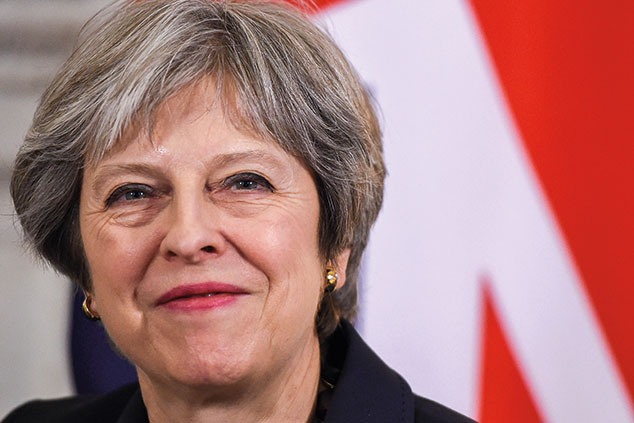
Determined diplomacy has shored up the PM, says Matthew Partridge.
“There is nothing quite like standing up to a foreign bully to enhance a leader’s domestic reputation,” says Philip Johnson in The Daily Telegraph. Theresa May, “in pulling together a co-ordinated international response to President Putin’s recklessness” by getting “some 30 countries to agree to withdraw diplomats”, is “outstanding”. She now appears “substantially more prime ministerial”. Her actions also send a clear message that Putin’s “revanchist inclinations will be resisted”. What’s more, “the danger of the UK being left isolated, thereby tempting Putin to go further and risking a military collision”, has been “averted”.
Give it a rest, says The Guardian’s Natalie Nougayrède. Europe’s decision to expel diplomats “had less to do with Theresa May’s diplomatic manoeuvring” than the belief of European governments that the use of chemical poisons “warranted an extraordinary response”. It was “Franco-German resolve”, rather than Britain’s “piecemeal approach” to diplomacy, that played a “decisive” role in creating a European consensus, with Macron in particular arguing “vehemently” for “the strongest possible collective response”. Overall, Britain’s “self-inflicted loss of influence and ensuing vulnerability” is “plain for all to see”.
There’s also the question of what follows from this action, as the “unprecedented” degree of cooperation doesn’t hide the fact that Britain has “leapfrogged” the question of what exactly it wants to achieve, argues Mark Galeotti in Foreign Policy magazine. At the moment it seems focused on punishing Russia “with a display of retaliatory resolution”. However, if the UK wants to “protect itself from the corrupting influence of Russian kleptocracy”, then it needs to show “greater political will” by using the laws available to go after Russian oligarchs. Whatever it decides, “there needs to be a clear, explicit, firm commitment to a strategic goal”.
Britain’s not the only country that will need to act, says The New York Times. Governments across the world, especially the US, “will have to go even further to push back effectively against Putin’s mischief”. While the expulsions show that “Russia will pay a price for using chemical weapons on allied territory”, there’s still the problem of “interference in the elections in America and other Western democracies and of propelling the wars in Ukraine and Syria”. It’s almost certain Russia will retaliate, leading to a “downward spiral” in relations with the West “unheard-of since the Cold War”.
But whatever the long-term ramifications of this affair, Theresa May’s “diplomatic coup” only “adds to the growing mood at Westminster that the PM might have got her groove back”, says Stephen Bush in The New Statesman. Having had “a good crisis”, there are even suggestions that “if she can get a good Brexit deal there will be no real pretext to get rid of her”. She could even fight the next election. By contrast, Labour scepticism over Corbyn, lambasted for his weak response to Russia and the anti-semitism row (see below), is increasing again.
Corbyn’s authority is dwindling
“The Labour Party has deep historical connections with British Jewry and its sister party in Israel,” notes The Times. So it is “almost beyond belief” that things have reached a point where the current leader has been criticised by the Board of Deputies of British Jews and the Jewish Leadership Council for “siding with anti-Semites”. Specifically, Corbyn has been attacked for being a member of three Facebook groups “in which anti-semitic conspiracy theories were commonplace” and objecting seven years ago to the removal of a street mural “with an unambiguously anti-semitic message”.
“Guilt by association is a standard political attack method and it is not always fair,” says The Independent’s Tom Peck. Similarly, “judging a person by which Facebook groups they are in is absurd”. It’s also likely that Corbyn’s apparent tolerance of people with “appalling” views comes from his belief that “all problems can be solved through dialogue [so] no one can be too unpalatable to speak to”. However, the fact remains that “Labour’s mad hard left are emboldened by having a man they view as one of their own in charge”. Overall, he needs to “convince his own keyboard warriors to desist”.
Corbyn needs to get his act together, says The Guardian. He “has not been quick, clear or uncompromising enough” to deal with this scourge while he has been leader. Furthermore, with his limited and reluctant response to the current controversy, he has missed another opportunity to “give a clear lead and ensure there is no hiding place” for anti-Jewish prejudice. Overall, this controversy “risks reducing both his moral and political authority”.